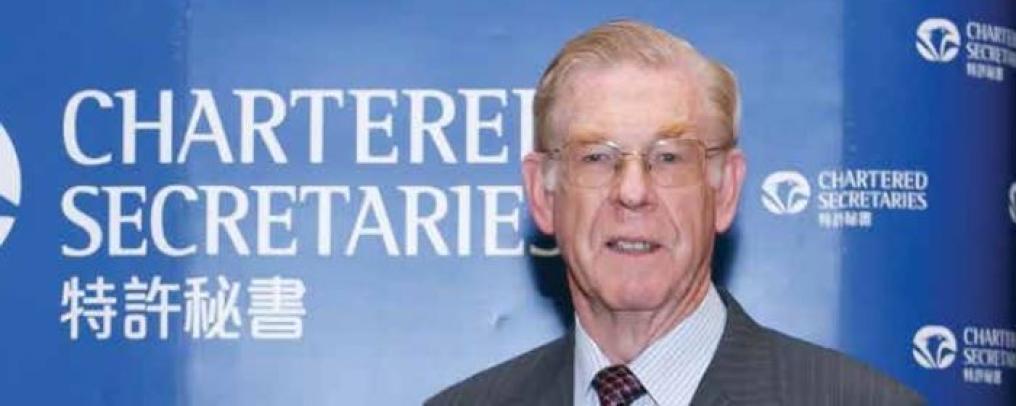The Institute's corporate governance paper competition is run biennially in tandem with the Institute's corporate governance conferences. This month, CSj publishes the second and final part of the winning paper in this year's competition, in which the authors make recommendations on, among other things, how to build better channels of communication with shareholders and potential whistleblowers in line with international best practice.
The major aim of the recent changes to the corporate governance requirements introduced by Hong Kong and Exchanges and Clearing Ltd (HKEx) was to raise the overall standard of issuers’ corporate governance and coordinate HKEx's Corporate Governance Code (the Code) and listing rules with international best practice. Issuers and the market as a whole benefit from more effective and efficient corporate governance. The following is a series of recommendations to help companies adhere to the requirements of HKEx and to build better corporate governance.
Modifying shareholder communication policies
HKEx introduced a code provision in 2012, stating that issuers should establish a shareholder communication policy, which consists of rules and procedures to enable effective communication with shareholders. The aim of this was to ensure that shareholders and investors are provided with equal, ready and timely access to comprehensive and balanced, financial and corporate information on issuers. Recommendation – Companies should further modify their shareholder communication policies to make them more specific and easier to comply with, so that shareholders and investors can engage more actively with them. For example, they can follow HSBC's example to set a rule to require issuers to have alternative channels for shareholders to use in situations where they cannot approach the chairman or chief executive. The company can then implement measures to deal with shareholders quickly, which can enable a more efficient process.
HSBC implemented a policy recently by which, if shareholders are unable to attend and vote at general meetings, they are encouraged to appoint an authorised agent 'to attend, speak and vote on their behalf’ – see Shareholder Communication Policy (2014), HSBC Holdings plc. This is a good example for other companies to follow, and companies can use this as a basis to make adjustments to their shareholder communication policy in order to assure shareholders of fair and equal treatment.
Recommendation – A further change that companies can implement is having a senior independent non-executive director attend meetings with investors in order to listen to their opinions and concerns. In this way, a balanced understanding of views, as well as the concerns of major shareholders, can be ensured.
Setting suitable board diversity policies
It is actually quite challenging to put board diversity policies into practice. This is because every company differs according to its individual circumstances, organisational size and complexity, as well as the business risks and challenges that it encounters. Hence, each company should have its own board diversity policies that suit its own situation. Recommendation – Although board diversity is important, companies should not be too aggressive in diversifying the board. For instance, companies should first evaluate their business and financial situation and strategies, and then decide the most important criteria that the company wants to improve in terms of diversity, such as gender, age or profession.
A good example that companies can follow is that of Cathay Pacific Airways. According to its Board Diversity Policy Statement issued in 2013, the reason why Cathay Pacific chose nine key factors (including gender, age, cultural and educational background) when considering diversifying the board is due to its business environment. Cathay Pacific's business environment is highly diverse, so it is crucial for it to consider the best interests of all kinds of stakeholders. Stakeholders have great influence over Cathay Pacific so the nine key factors determining board structure are relevant to their interests. This demonstrates how a company can take its own circumstances and business environment into account when considering the diversity of the board so as to make the policy more suitable for the company.
Recommendation – Companies should review their own board compositions, comparing them with those of their industry peers, before determining an appropriate level of diversity. Companies should also make sure that their board diversity policy aligns with their business goals and values. Finally, companies should monitor the policy, evaluate its effectiveness, and analyse whether the desired diversity has been achieved. Continuous review and modification should also be made so as to constantly improve the diversity of board and achieve fairness.
Building an effective whistleblowing policy
A whistleblowing system is of fundamental value to a firm's professional integrity, as it places great emphasis on reporting any inappropriate or unethical acts. It enables individuals who believe they have detected serious malpractice or impropriety to express concerns internally in a responsible manner while providing confidentiality and protecting whistleblowers from any form of victimisation, harassment or disciplinary proceedings. The importance of having a whistleblowing policy was shown in the US$3.8 billion accounting fraud at WorldCom in 2003. The telecommunications giant accumulated $41 billion debt and eventually filed for bankruptcy. Cynthia Cooper, an internal auditor at WorldCom, exposed accounting improprieties behind the greatest corporate fraud in history. Her effective whistleblowing disclosed the company's malpractices and put a halt to them. The report of the Special Investigative Committee of the WorldCom board stated 'That the fraud continued as long as it did was due to a lack of courage to blow the whistle on the part of others in WorldCom's financial and accounting departments.’
This lack of courage among employees arises from companies not promoting whistleblowing, and employees believing that they will be disadvantaged if they voice concerns. In this environment, the malpractice continues undetected. As shown by the evidence in WorldCom's case, this can lead to catastrophic consequences. Having an effective whistleblowing policy can act as a deterrent and prevent employees from committing fraud or any kind of unethical acts.
Recommendation – Develop a comprehensive plan that encompasses various forms of communication to implement a whistleblowing mechanism. Individuals may raise a concern through several channels including the use of a special telephone hotline, email, web form, regular mail or fax. The system can be outsourced to a third party since this means employees can be assured that the whole whistleblowing process is handled independently and the allegation is passed to the appropriate person.
Updating training for directors
Obtaining a general understanding of the company's business is not that easy. Therefore, companies should make improvements to their internal practices to enable directors to understand their business better. Recommendation – Updating training is a good way for directors to have a better idea of the scope of the company's businesses and their duties. For instance, management overviews, daily business operation reviews and internal problem-solving procedures can be provided in directors’ training. This makes it easier for them to take an active interest in the issuers’ business.Keep track of directors’ activities
To ensure directors have a general understanding of the company and active interest in its affairs, there is a need to keep the activities of directors up-to-date. Recommendation – Companies should establish policies to keep track of directors’ activities and attendance so as to ensure sufficient time and resources are put in board meetings, training, time spent on corporate governance, etc. In this way, the best interests of issuers can be protected while capital and resources can also be utilised efficiently, which in turn can benefit corporate performance.Provide management updates
In order to support directors with management updates, it is important that there is an efficient and productive system in the company to ensure up-to-date information is always provided. Recommendation – Automation of manual business processes is a good approach to achieving this. Automation of manual business processes is a method used by companies to optimise and centralise all the vital processes in the business operation. Advanced technologies are used in automating the jobs involved when performing these processes. Automating manual business processes can simplify operational processes and enable them to become more accurate and consistent. This is because the automation of business processes can greatly reduce the amount of paper documents, eliminate unwanted procedures such as filing of some documents, and shorten the workflow. Companies can then benefit from high efficiency in their business operations.
Automation of business processes also facilitates better communication and collaboration within the company. This is because automating processes allows companies to improve data access and provide managers and directors with data analytics tools. This in turns enables managers and directors to make better decisions based on the timely while accurate information provided.
Financial reporting and internal controls
The audit committee should develop procedures for handling employee concerns regarding irregularities in financial reporting or auditing matters, and ensure that appropriate arrangements are made for the independent and unbiased investigation of such concerns. Recommendation – The audit committee should also ensure that appropriate follow-up action is taken to deal with irregularities in financial reporting or auditing matters. The committee should have access to sufficient resources in order to carry out its investigatory duties and ensure that its members are provided with appropriate and timely information.Moving forward
Corporate governance rules and roles are constantly changing and improving. From the above analysis, we can see that boards of directors are being pushed by new rules and provisions to become more independent and diverse, while their greater involvement in the companies in which they serve is also encouraged. Different parties associated with companies are better connected, and at the same time shareholder communication is enhanced through improved transparency and disclosure of company information to the public.
These factors enable the public to obtain a better understanding of the structure and activities of companies. Shareholders and potential investors can then have access to more reliable and comparable company information in greater detail. More informed decisions can hence be made; creating an environment that is favourable for corporate development. Consequently, shareholders’ interests can be protected and safeguarded in a better way; this in turns attracts a diverse base of international quality investors. Hence, the ability of corporate governance to protect shareholders’ interests can in fact affect Hong Kong's long-term standing as one of the most well-known and reliable international financial centres in the world.
Companies should therefore always keep abreast of the changes in corporate governance rules while at the same time implement policies so as to better manage and safeguard shareholders’ rights. Only in this way can companies adapt to the ever-changing business environment.
Joyce Tang Dik Ying, Department of Accounting, Lingnan University; and Stacy Wong Hei Yu, School of Accounting and Finance, The Hong Kong Polytechnic University
The first part of this article was published in the December 2014 issue of CSj. To promote good corporate governance awareness among local undergraduates, the Institute has been running its 'Corporate Governance Paper Competition and Presentation Award’ since 2006.
SIDEBAR: Whistleblowing recommendations
Useful measures to build a supportive environment for whistleblowers include those listed below.
- Develop adequate and meaningful rewards for whistleblowing.
- Introduce a detailed non- retaliation policy to protect whistleblowers.
- Include the details of the policy in the code of ethics for employees, periodic speeches from senior management, orientation and refresher training.
- Set up an independent investigation committee to look into whistleblowing reports.
- Appoint compliance officers to ensure compliance and enforcement of the code of ethics.
- Launch a records retention policy for whistleblowing reports and investigations.
- Expand the role of the audit committee to provide support for board systems and procedures. The audit committee should be informed of whistleblowing reports so that it considers the impact these may cause in its general opinion to the board on the organisation's risk management and internal controls.



